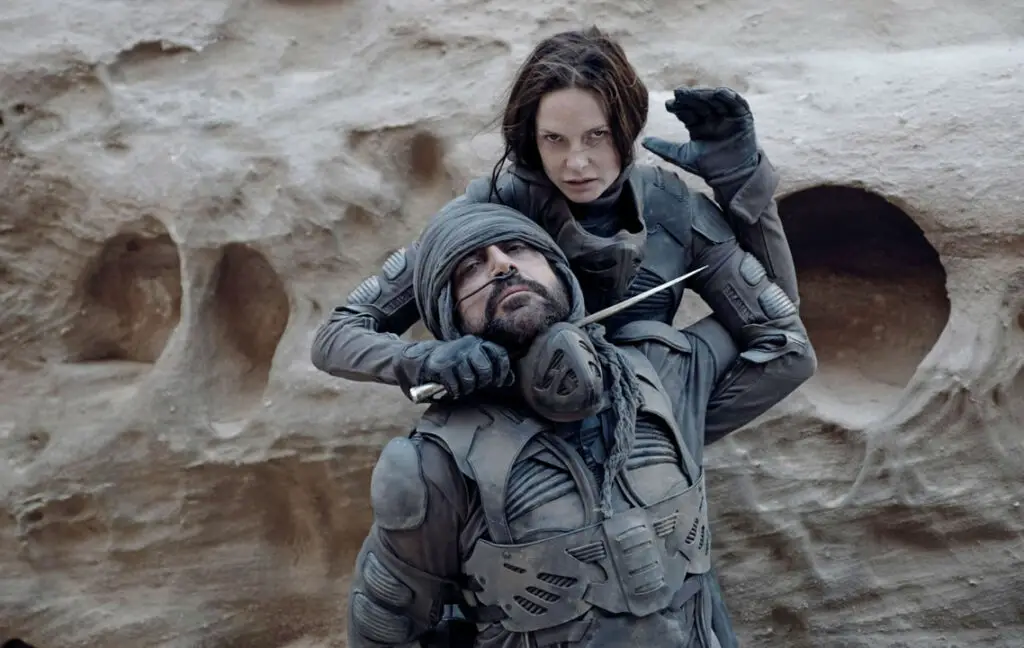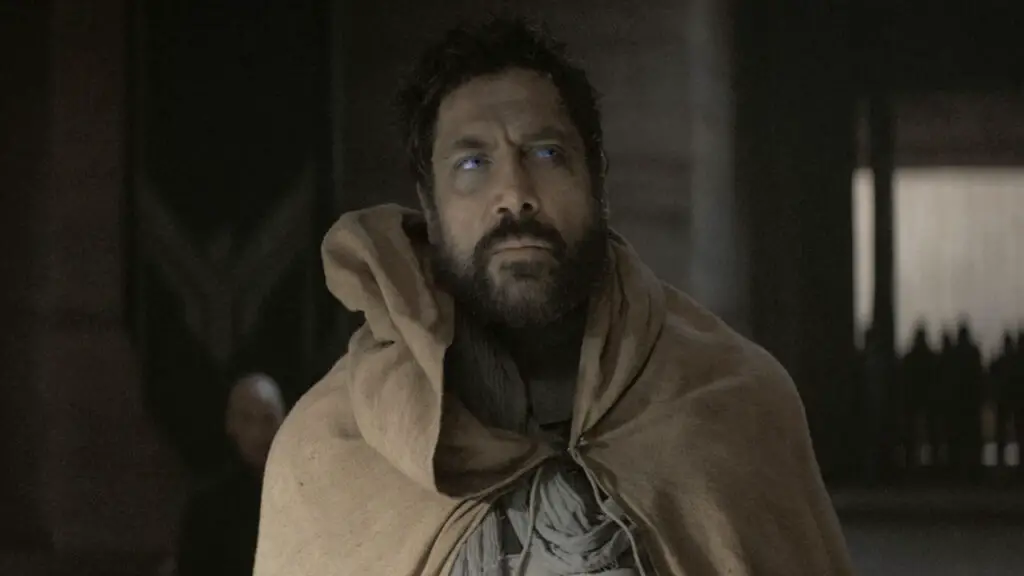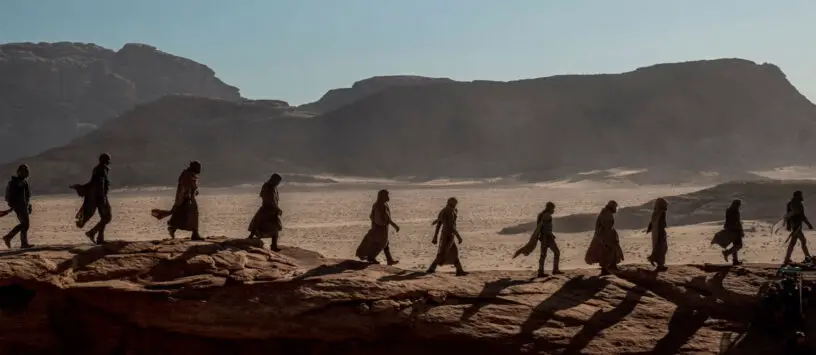The depiction of the Fremen in director Denis Villeneuve’s movies, Dune: Part One (2021) and Dune: Part Two (2024), may have you wondering: What are the Fremen like in Frank Herbert’s original Dune novel? Which real-world peoples and cultures might they resemble? Do the book and films fall back on romanticized or Orientalist stereotypes for the Fremen or do something different?
Let’s answer these questions by exploring the depiction of the Fremen on the page and on screen. In this article, the first of a series about the Fremen, we’ll begin by looking at the key characteristics of the Fremen in Herbert’s book.
Independent
Our first exposure to the Fremen as characters comes when they are described as having a certain independence from the structures of the Imperium, the term for the empire in the feudal-style universe of Dune. The young protagonist, Paul Atreides, recalls his teacher Dr. Yueh telling him that:
The faufreluches class system was not rigidly guarded on Arrakis. The planet sheltered people who lived at the desert edge without caid or bashar to command them: will-o’-the-sand people called Fremen, marked down on no census of the Imperial Regate.
Through this brief passage, we learn that the Fremen live outside the boundaries of the things that bring hierarchy in the Imperium: social classes, military commanders, government censuses.
We continue to discover ways that the Fremen are different from other people. Thufir Hawat is irritated to find that his Mentat training in logic and probabilities doesn’t help him uncover a Fremen’s motives—they appear to not be easily readable. Their blue-in-blue eyes also make aspects of their facial expression unreadable. Hawat finds the Fremen’s directness disconcerting, when one of them openly asks Hawat what he fears. That same Fremen explains to Hawat that the Fremen don’t have the “Byzantine corruption” and cannot be bought off by a reward for Hawat’s head. This indicates the Fremen have not had their honor tainted by the treachery and political intrigue seen elsewhere in the Imperium.
When Jessica questions how she’ll know that the Fremen leader Stilgar will keep his word to her, he seems offended:
Out here, woman, we carry no paper for contracts. We make no evening promises to be broken at dawn. When a man says a thing, that’s the contract. As leader of my people, I’ve put them in bond to my word.
He implies that her people are the ones who break promises and put more faith in paper than people. Later, Stilgar tells Paul, “I am one who does not pay the fai, the water tribute, to the Harkonnens.” By this he means that he doesn’t pay tax to the rulers of the planet and isn’t part of the Imperial system.

Cautious
The Fremen are depicted as cautious, waiting to see if House Atreides will rule Arrakis differently than the Harkonnens, before passing judgement. Thufir Hawat says that:
The Fremen appear more and more to be the allies we need. They’re waiting now to see if they can trust us, but they appear to be dealing openly. They’ve sent us a gift — stillsuits of their own manufacture … maps of certain desert areas surrounding strongpoints the Harkonnens left behind … Their intelligence reports have proved completely reliable…
Duke Leto Atreides tells Jessica that the Fremen have promised to stop raiding villages during a truce period, which shows their openness to working with the Atreides.
When Jessica and Paul seek safety among the Fremen, Stilgar shows that the Fremen are very wary of outsiders because they threaten the tribe’s survival: “Unless you’ve been deep-trained from childhood to live here, you could bring destruction onto an entire tribe. It is the law…” The Fremen do not leap to judgement but remain cautious, seeking after more information and following the rules in their society which help ensure their survival.
Strong and Violent
The Fremen project a sense of power and strength and are shown to be supremely good fighters. Dr. Yueh tells Paul that the Fremen are brave to live at the edge of the desert and that everyone—men, women, and children—is fierce, violent, and dangerous. This prepares us with an image of these independent people living in a harsh environment. The first Fremen we meet (aside from the girl in Paul’s dreams) is the Shadout Mapes, a knobby, gray-haired woman whose undernourished appearance hides her strength and vitality. Mapes is prepared to cut Jessica down with a crysknife if she doesn’t align with the prophecy.
Next, acting as another type of representative for the Fremen as a people, Stilgar makes a bold entrance into Leto’s hall with a “a vibrant and penetrating voice” and a mysterious appearance, almost totally covered in his robe, hood, and black veil with total blue eyes. Paul studies this Fremen, “sensing the aura of power that radiated from him.” Later, Jessica thinks to herself that she doesn’t want to use the Voice on Stilgar because “he’s a strong man … worth much more to us unblunted and with full freedom of action.”

At the banquet with Dr. Kynes/Liet—the Imperial Planetologist who has a dual allegiance with the Fremen—Jessica studies him and realizes he would have killed the banker who was bothering him without hesitating. She suspects Kynes is “a casual killer, and she guessed that this was a Fremen quality.” The Appendix confirms that Liet-Kynes does indeed know how to kill and had killed more than one hundred Harkonnens by the time he was 19.
Throughout the rest of the story, we see or hear about the Fremen battling their enemies with success. For instance, a Fremen calmly tells Thufir Hawat that their group lost two men while taking out one hundred Harkonnen and Sardaukar troops, leaving Hawat flabbergasted that the Fremen would speak so casually about this disparity. Then the Fremen says they even captured three Sardaukar, which again shocks Hawat and his aide. This exchange shows how good of fighters the Fremen are against the Emperor’s feared troops, and this is before Paul and Jessica teach them the weirding way of battle which increases the Fremen’s skills.
The rest of the Imperium continues to underestimate the Fremen’s strength, which leads to their ultimate fall from power. At the close of the story, the Emperor expresses shock that he sent in five troop carriers of his Sardaukar troops to pick up prisoners and they only escaped with a handful of men, three prisoners, and one carrier. The Sardaukar were “almost overwhelmed by a force composed mostly of women, children, and old men” and only got away by using their carrier’s jets as a flame-thrower. The superiority of the Fremen as fighters shows through in their continual triumphs against both Harkonnen and Sardaukar enemies.
Conclusion
We’ve seen how Dune shows the Fremen to be an independent, cautious, strong, and violent people living in the deserts of Arrakis. In the next article, we’ll look at how the Fremen have adapted to not only survive but thrive on this harsh planet through strict water discipline and skills in technology and science.



